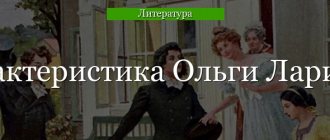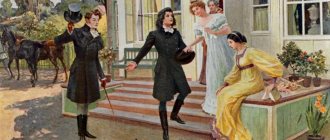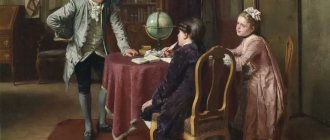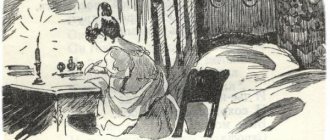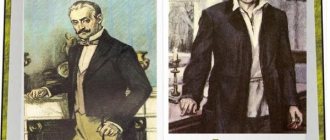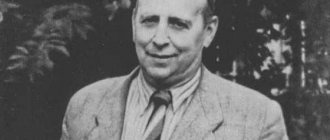Business ideas
The novel “Eugene Onegin” is the great creation of the brilliant Pushkin. The immortal work reflects Russian life in the first decades of the 19th century with all the force of the author’s realism. The poet describes all aspects of Russian reality, all layers of the nation, and shows typical representatives of the noble society of that era. This typical image in the novel is the main character - Eugene Onegin, in whom the features of a “suffering egoist”, “superfluous person” are clearly visible.
Onegin is a child of secular society; he received the upbringing and education typical of a young nobleman. The main character of the novel speaks perfect French, dances well and bows gracefully, which is quite enough in high society. Onegin is considered an intelligent and sweet person. Pushkin ironically remarks:
We all learned a little bit
Something and somehow
So upbringing, thank God,
It's no wonder for us to shine.
Evgeniy leads the life of a darling of fate, a sybarite. He spends time at endless balls, evenings, visits restaurants, theaters. The young nobleman perfectly mastered the “science of tender passion,” but the author notes that love intrigues occupied Onegin’s “yearning laziness.” The monotony and diversity of life in secular society gradually bores the main character. He becomes disillusioned with the emptiness and purposelessness of such an existence:
But early his feelings cooled down,
He was tired of the noise of the world...
Onegin differs from other representatives of secular Petersburg. He is smart and talented, capable of correctly assessing life and the people who surround him. No wonder Pushkin speaks with great sympathy about his hero. Evgeniy is the author’s “good... friend”. What is so sweet to Pushkin about the nature of the main character? The poet writes:
I liked his features
Involuntary devotion to dreams,
Inimitable strangeness
And a sharp, chilled mind.
It is these qualities that do not allow Onegin to continue to lead an idle life. However, the tragedy of the hero is that he well understands the wrongness of such a life, but does not know how to live. Evgeniy is trying to change the sluggish passage of time, he is trying to engage in useful activities in order to somehow shake himself up. The main character begins to read books and engages in writing, but this does not lead to anything good. Pushkin reveals the truth to us:
But he was sick of hard work...
Life in high society destroys in a person the habit of work, the desire to act. This is what happens with Onegin. His soul simply withered under the influence of the light. Evgeniy is frankly bored in any company. He does everything “out of boredom,” “just to pass the time.” This is what explains Onegin’s friendship with Lensky and the implementation of reforms on the protagonist’s estate. Evgeny values his peace most of all, so he does not want to reciprocate Tatyana Larina when the girl herself confesses her love to the hero. Onegin sees that Tatyana is an original and deep nature, but the egoist in Eugene is stronger than Pushkin’s “good friend”. Onegin inflicts a spiritual wound on “sweet Tanya”, he arouses the jealousy of the naive and ardent Lensky, and the reason for everything is the “longing laziness” of the protagonist. He is an egoist, but a suffering egoist. Onegin's actions and behavior bring misfortune not only to those around him, but also to himself. He lived too long in high society and absorbed all the vices of that society, “living without a goal, without work until he was twenty-six years old.” Evgeny tried to leave, to break with secular Petersburg, but he failed to achieve this. A child of light, he cannot rise above the wretched landed nobility surrounding the hero and prefers to shoot with Lensky so as not to become an object of ridicule. Realizing that he needs to make peace with Vladimir, Evgeniy nevertheless fires a fatal shot for the young poet. After the murder of Lensky, Evgeny suffers, but the fear of gossip and slander turned out to be stronger than the feeling of his own wrong. Onegin was afraid of the opinions of those people whom he himself despised, at whom he laughed in conversations with Lensky. Selfishness also lies at the basis of Evgeny’s attitude towards Tatyana Larina. The hero of Pushkin's novel did not want to respond to the feelings of the naive girl, even realizing that she was worthy of love. Onegin did not want to change his habits:
No matter how much I love you,
Once I get used to it, I’ll stop loving it immediately.
However, Evgeny falls passionately in love with Tatiana when she becomes a noble lady, a representative of the capital's society, and Larina understands well what is the reason for Onegin's feelings for her. This is the love of an egoist, brought up in secular St. Petersburg and well aware of the “science of tender passion.”
The image of Onegin opens a gallery of “superfluous people” in Russian literature of the 19th century. Without him, Pechorin, rightly called the “younger brother” of Pushkin’s hero, would have been impossible; there are features of Evgeniy in Oblomov and Rudin. Eugene Onegin is a typical hero of the era of the twenties, a “suffering egoist” that society made him that way.
In the novel “Eugene Onegin,” Pushkin outlined with light strokes the nobility - the people in whose company Eugene Onegin moved, and with whom, in addition to the main characters, he had to maintain relationships and communicate. The capital's nobility was strikingly different from the provincial landowners who lived in the outback. This gap was all the more noticeable the less often landowners traveled to the capital. The interests, level of culture, and education of both were often at different levels.
The images of landowners and high society nobility were only partly fictitious. Pushkin himself moved among them, and most of the paintings depicted in the work were spotted at social events, balls, and dinners. The poet communicated with provincial society during his forced exile in Mikhailovskoye and during his stay in Boldino. Therefore, the life of the nobility, both in the countryside and in Moscow and St. Petersburg, is depicted by poets with knowledge of the matter.
Provincial landed nobility
Along with the Larin family, other landowners lived in the province. The reader meets most of them at their name day. But some sketches to the portraits of neighboring landowners can be seen in the second chapter, when Onegin settled in the village. Simple in their mental makeup, even somewhat primitive people tried to make friends with their new neighbor, but as soon as he saw the droshky approaching, he mounted his horse and rode off the back porch so as not to be noticed. The maneuver of the newly-minted landowner was noticed, and the neighbors, offended by their best intentions, stopped their attempts to establish friendship with Onegin. Pushkin interestingly describes the reaction to the replacement of corvée with quitrent:
But in his corner he sulked, Seeing this terrible harm, His calculating neighbor; The other smiled slyly, And everyone decided out loud that he was the most dangerous eccentric.
The attitude of the nobles towards Onegin became hostile. Sharp-tongued gossips began to talk about him:
“Our neighbor is ignorant; crazy; He is a pharmacist; he drinks one glass of red wine; He doesn't suit ladies' arms; All Yes
Not
really;
will not say
yes,
sir
, or no, sir
.” That was the general voice.
Invented stories can show the level of intelligence and education of people. And since he left much to be desired, Lensky was also not happy with his neighbors, although he paid them visits out of politeness. Although
The lords of the neighboring villages did not like the feasts;
Some landowners whose daughters were growing up dreamed of getting a “rich neighbor” to be their son-in-law. And since Lensky did not seek to fall into anyone’s skillfully placed networks, he also began to visit his neighbors less and less:
He ran away from their noisy conversation. Their conversation is prudent: About haymaking, about wine, About the kennel, about their relatives.
In addition, Lensky was in love with Olga Larina and spent almost all his evenings with their family.
Almost all the neighbors came to Tatyana’s name day:
Fat Pustyakov arrived with his portly wife; Gvozdin, an excellent owner, Owner of poor peasants;
Here Pushkin is clearly being ironic. But, unfortunately, there were quite a few of the landowners like the Gvozdins, who fleeced their men like sticks.
The Skotinins, a gray-haired couple, With children of all ages, counting From thirty to two years old; The district dandy Petushkov, My cousin, Buyanov, In fluff, in a cap with a visor (As you know him, of course), And the retired councilor Flyanov, A heavy gossip, an old rogue, A glutton, a bribe-taker and a buffoon.
XXVII
Monsieur Triquet, the Wit, recently from Tambov, with glasses and a red wig, also came with Panfil Kharlikov’s family.
Pushkin does not need to spend long stanzas characterizing the guest landowners. The names spoke for themselves.
The celebration was attended not only by landowners representing several generations. The older generation was represented by the Skotinins, a gray-haired couple, they were clearly over 50, retired adviser Flyanov, he was also well over 40. In each family there were children who made up the younger generation, who were happy about the regimental orchestra and dancing.
The provincial nobility tries to imitate the capital by organizing balls and celebrations, but here everything is much more modest. If in St. Petersburg they offer dishes prepared by French chefs from overseas products, then in the provinces they put their own reserves on the table. The over-salted fatty pie was prepared by yard cooks, and liqueurs and liqueurs were made from berries and fruits collected in one’s own garden.
In the next chapter, which describes the preparation for the duel, the reader will meet another landowner
Zaretsky, once a brawler, Ataman of a gambling gang, Head of a rake, tavern tribune, Now a kind and simple father of a single family, Reliable friend, peaceful landowner and even an honest man.
It’s him, Onegin is afraid, never having decided to offer reconciliation to Lensky. He knew that Zaretsky could
To quarrel young friends And put them on the fence, Or force them to make peace, So that the three of us can have breakfast, And then secretly dishonor them with a cheerful joke, a lie.
Secular society in the novel by A.S. Pushkin "Eugene Onegin"
Works › Pushkin A.S. > Eugene Onegin
Ready Homework
Truthfulness is one of the main qualities of the novel “Eugene Onegin”. In it A.S. Pushkin reflected the reality of the 19th century: people’s habits, their actions, secular society itself. That is why “Eugene Onegin” is an invaluable work in historical and literary terms.
The great critic Belinsky called this novel “an encyclopedia of Russian life.” And indeed it is. It is in this work by A.S. Pushkin was one of the first poets to decide to depict society to readers as it was in the 19th century. Secular society in “Eugene Onegin” is not shown from the best side.
In this society, it was enough to dress smartly and do your hair. And then everyone began to consider you a secular person. This happened with the main character of the novel, Onegin. He was bored with social life, and the society that surrounded him oppressed the hero.
This life killed all feelings in the main character, and it was impossible for him to escape anywhere from the mood that was in his soul. Onegin is opposed to the majority of people of this era, and secular society does not accept him. Evgeniy is forced to leave. He arrives in the village.
From this moment we are transported to a completely different environment, where everything was much calmer than in the city. The main character was not accepted here either, since he was sharply different from the majority of the village population. But here, too, Onegin managed to find people who understood him. Here he found a devoted friend Lensky, the true love of Tatyana Larina.
Tatyana grew up as a reserved girl, but with a huge imagination, her soul was constantly full of many different feelings:
One wanders with a dangerous book,
She searches and finds in her
Your secret heat, your dreams...
Having given her heart to Onegin, Tatyana could no longer trust her secret to anyone, not even her closest relatives. And not only because she was a secretive girl, but also because the society around her would never be able to understand her.
This situation occurs quite often nowadays. The surrounding society does not allow a person to develop individually: it either adjusts it in its own way or rejects it.
The person becomes withdrawn and is afraid to trust anyone.
Advice
This work has great historical significance. Studying “Eugene Onegin”, the reader learns what the life of people was like, their activities, habits, holidays; Pushkin describes in detail the festive atmosphere of Tatyana Larina’s name day, guests who seemed to her completely boring people, dances:
Moscow Noble Society
Tatiana came to Moscow not by chance. She came with her mother to the brides fair. Close relatives of the Larins lived in Moscow, and Tatyana and her mother stayed with them. In Moscow, Tatyana came into close contact with noble society, which was more archaic and rigid than in St. Petersburg or the provinces.
In Moscow, Tanya was greeted warmly and cordially by her relatives. The old women were scattered in memories, the “young graces of Moscow”, having taken a closer look at their new relative and friend, found a common language with her, shared the secrets of beauty and fashion, talked about their heartfelt victories and tried to extract her secrets from Tatyana. But
the secret of his heart, a treasured treasure of tears and happiness, he keeps silently and does not share it with anyone.
Guests came to Aunt Alina's mansion. To avoid appearing too distracted or arrogant,
Tatyana wants to listen closely to conversations, to general conversation; But everyone in the living room is occupied by such incoherent, vulgar nonsense; Everything about them is so pale and indifferent; They slander even boringly.
All this was not interesting to the romantically inclined girl, who, deep down, was perhaps waiting for some kind of miracle. She often stood somewhere on the side, and only
A crowd of young men look at Tanya primly and talk unfavorably about her among themselves.
Of course, such “archival youths” could not interest the young lady. Here Pushkin used the Old Church Slavonic form of the adjective to emphasize that the “young men” belonged to the “past century.” At the end of the 18th century and the first half of the 19th century, late marriages were not uncommon. Men were forced to serve in order to make a certain fortune, and only then got married. But they chose young girls as brides. So marriages that were unequal in age were not uncommon at that time. They looked down on the provincial young lady.
Together with her mother or cousins, Tatyana visited theaters and was taken to Moscow balls.
There is cramped space, excitement, heat, the roar of music, the sparkle of candles, the flickering, the whirlwind of fast couples, the light dresses of beauties, the choirs full of people, the vast semicircle of brides, all the senses are suddenly amazed. Here the smart dandies show off their impudence, their vest, and their inattentive lorgnette. Here the hussars on vacation are in a hurry to appear, thunder, flash, captivate and fly away.
At one of the balls, her future husband drew attention to Tatiana.
The duality of the depiction of secular society in the novel “Eugene Onegin”
Human consciousness and the system of life values, as is clear, are largely shaped by moral laws adopted in society. Pushkin announces in the novel both the capital and the Moscow and provincial nobility.
The author of the novel pays special sensitivity to the St. Petersburg nobility, a typical representative of which is Eugene Onegin. The poet describes in every detail the day of his hero, and Onegin’s day is a typical day of a metropolitan nobleman. Thus, Pushkin recreates a picture of the life of the entire St. Petersburg secular society.
A fashionable daytime stroll along a specific route (“Wearing a spacious bolivar, Onegin goes to the boulevard...”), lunch at a restaurant, a visit to the theater. Moreover, for Onegin the theater is not an artistic spectacle and, moreover, not a kind of club, but rather a place of love affairs and behind-the-scenes hobbies.
Pushkin gives his hero the following characteristics:
The theater's angry legislator,
Fickle Adorer
Charming actresses
Honorary citizen of the backstage...
Pushkin describes Onegin’s office and his outfit in great detail.
The author seems to want to once again emphasize the isolation of young people of that time from the national soil, because from early childhood they were in an atmosphere of a foreign language, people (governesses and tutors were foreigners) and things. (“But trousers, tailcoat, vest, /All these words are not in Russian…”). The day of the young dandy ends with a ball, a favorite pastime of the capital's nobles.
Pushkin speaks of St. Petersburg high society with a fair amount of irony and without much sympathy, because life in the capital is “monotonous and colorful,” and “the noise of the world gets boring very quickly.”
The local, provincial nobility is represented in the novel in a very spacious manner. This is Onegin’s uncle, the Larin family guests at Tatiana’s name day, Zaretsky.
note
Onegin’s uncle was a “village old-timer”, he was busy quarreling with the housekeeper, looking out the window, squashing flies and reading the “eighth year calendar”.
We recommend reading ►
My first teacher
Prominent representatives of the provincial nobility gather at Tatiana’s name day: Gvozdin, “an excellent master, a master of poor men”; Petushkov, “county dandy”; Flyanov, “heavy gossip, old rogue.”
If Pushkin introduces real historical figures, for example Kaverin, into the story about the capital’s nobility, then in this case the author uses the names of famous literary characters: Skotinins are the heroes of Fonvizin’s “The Minor,” Buyanov is the hero of V.L. Pushkin’s “Dangerous Neighbor.” The author also uses telling surnames.
For example, Triquet means “beaten with a stick” - a hint that he cannot be accepted in high society, but in the provinces he is a welcome guest.
Not far from Lensky lives Zaretsky, “once a brawler”, “the head of a rake”, now “a single father of a family”, “a peaceful landowner”.
But he cannot be called a decent person, because he loves “to quarrel young friends / And put them on the barrier.” This is what happens in the case of Lensky and Onegin.
In general, Zaretsky is responsible for the death of Lensky; although he, as a second, could have prevented the duel, he did everything possible to ensure that it took place.
And Vladimir Lensky can be classified as a local nobleman. He is “a romantic and nothing more,” according to Belinsky’s definition. As a romantic, he does not know life at all, he sees people either in a rosy or black light (“He was an ignoramus at heart…”). He is alienated from national culture, perhaps more so than Onegin (his neighbors call Lensky half-Russian).
Important
When discussing the future of Vladimir Lensky, Pushkin sees two possible paths. Following the first of them, he could become Kutuzov, Nelson or Napoleon, or, moreover, end his life like Ryleev, because Lensky is a passionate man, capable of a reckless, but heroic act (in this he is close to Pushkin).
But his trouble is that the environment in which he finds himself is hostile to him, in it he is considered an eccentric. Lensky would rather take the second path:
We recommend reading ►
Poems about the purpose of the poet and poetry
Or maybe even that: a poet
The ordinary one was waiting for his destiny.
He would have become an ordinary landowner, like Onegin’s uncle or Dmitry Larin.
Larin, about whom Belinsky says that he was “something like a polyp, belonging at the same time to two kingdoms of nature - plant and animal,” was a “kind fellow,” but in general an ordinary person (evidence of this is Ochakov’s medal, which was not an individual award, unlike an order). His wife was fond of books in her youth, but this hobby was rather age-related. She got married unwillingly and was taken to the village, where
Source: https://www.getsoch.net/dvojstvennost-izobrazheniya-svetskogo-obshhestva-v-romane-quot-evgenij-onegin-quot/
Nobility in Pushkin's novel “Eugene Onegin” | Literary guru
(376 words) Pushkin in his novel “Eugene Onegin” depicts the capital and local nobility, identifying similar and different features. In this analysis we really see the encyclopedia of Russian life that V. Belinsky wrote about.
Let's start with the capital's nobility. The author notes that life in St. Petersburg is “monotonous and colorful.” This is a late awakening, “notes” with invitations to a ball, party or children's party. The hero reluctantly chooses some kind of entertainment, then takes care of his appearance and goes to visit.
This is exactly how almost the entire noble society of St. Petersburg spends its time.
Here people are accustomed to external splendor, they care about being considered cultured and educated, so they devote a lot of time to talking about philosophy and literature, but in reality their culture is only superficial.
For example, visiting the theater in St. Petersburg has been turned into a ritual. Onegin comes to the ballet, although he is not at all interested in what is happening on stage. As for spiritual life, Tatyana in the finale calls social life a masquerade. The nobility in the capital lives only with feigned feelings.
In Moscow, according to the author, there are fewer claims to high European culture. In chapter 7 he makes no mention of theater, literature, or philosophy. But here you can hear a lot of gossip.
Everyone is discussing each other, but at the same time all conversations are conducted within the framework of accepted rules, so in a secular living room you will not hear a single living word.
The author also notes that representatives of Moscow society do not change over time: “Lukerya Lvovna is whitewashing everything, Lyubov Petrovna is also lying.” Lack of change means that these people do not truly live, but only exist.
The local nobility is depicted in connection with the village life of Onegin and the life of the Larin family. Landowners, in the author's perception, are simple and kind people. They live in unity with nature. They are close to folk traditions and customs. For example, it is said about the Larin family: “They kept in life the peaceful habits of the dear old days.”
Advice
The author writes about them with a warmer feeling than about the metropolitan nobles, since life in the village is more natural. They are easy to communicate and capable of making friends. However, Pushkin does not idealize them. First of all, the landowners are far from high culture. They practically don't read books.
For example, Onegin’s uncle only read the calendar, Tatyana’s father did not like to read at all, however, he “saw no harm in books,” so he allowed his daughter to get carried away with them.
Thus, the landowners in Pushkin’s portrayal are good-natured, natural people, but not too developed, and the courtiers appear as false, hypocritical, idle, but slightly more educated nobles.
Source: https://LiteraGuru.ru/dvoryanstvo-v-romane-pushkina-evgenij-onegin/
